|
|
|
Sort Order |
|
|
|
Items / Page
|
|
|
|
|
|
|
| Srl | Item |
| 1 |
ID:
193036
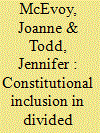

|
|
|
|
|
| Summary/Abstract |
Processes of constitutional discussion increasingly invite widespread popular inclusion and participation. Conceptual and practical problems remain, not least the respects in which inclusion is to take place. In deeply divided places, these challenges are intensified, first in the difficulties of conceptualising inclusion, and second in the practical dangers participation may pose to peace. We tackle these problems empirically by looking at a hard case of constitutional discussion amid division: the re-emergence of debate about Irish unity in Northern Ireland and the Republic of Ireland. Through focus groups and interviews, we explore how ‘others’, disengaged from the main political groups and defined transversally, approach the discussion, showing that they welcome the prospect of participation and seek to remove discursive triggers of conflict by focussing on shared everyday experience. We discuss the implications for the constitutional process and the likely impact on polarisation. The analysis has implications for the literature on divided societies, for constitutional theory and for policy. We argue that it is both possible and desirable to remedy group exclusion while facilitating universalistic discussion and lessening the dangers of polarisation. The policy implications are quite radical.
|
|
|
|
|
|
|
|
|
|
|
|
|
|
|
|
| 2 |
ID:
193014
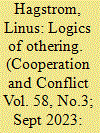

|
|
|
|
|
| Summary/Abstract |
‘Othering’ – the view or treatment of another person or group as intrinsically different from and alien to oneself – is a central concept in the International Relations literature on identity construction. It is often portrayed as a fairly singular and predominantly negative form of self/Other differentiation. During the first months of the COVID-19 pandemic, Sweden at first glance emerged as exactly such a negative Other. This article problematises such a view of Othering. Departing from a narrative analysis of news reporting on Sweden’s management of COVID-19 in the United States, Germany and the Nordic states, the article proposes an ideal type model with four forms of Othering – emotional, strategic, analytic and nuanced – not recognised in previous research. These types differ in their treatment of the Other as more or less significant and in involving a more or less self-reflexive construction of the self. Although narratives in all these settings drew on previously established narratives on Sweden, they followed different logics. This has implications for our understanding of Sweden as an Other in the time of COVID-19, as well as of self/Other relations in International Relations more broadly.
|
|
|
|
|
|
|
|
|
|
|
|
|
|
|
|
| 3 |
ID:
193013


|
|
|
|
|
| Summary/Abstract |
This article explores the everyday political economy of the Catholic World Youth Day in Panama, which was organized in January 2019. The aim is to shed more light on the relationship between the market and the religious sphere and, in particular, on the everyday experience of the WYD participants, and their encounters with the market and market practices. In doing so, the article challenges several commonly held assumptions, such as the priority of religious doctrine over everyday practices and the belief that the religious sphere is one-sidedly colonized by the market. Instead, the article shows that in this case, the interactions between the church and the market played out differently in three different areas – the discursive critique of the market by the Church leaders, the Church’s incorporation of market practices in its activities and the alliance between the local Catholic organizers and businesses. In the end, the complex interactions between the participants, businesses, discourses, spaces and technologies gave rise to a unique sacred-market network which blurred and at times entirely erased the difference between the religious sphere and the market.
|
|
|
|
|
|
|
|
|
|
|
|
|
|
|
|
| 4 |
ID:
193016
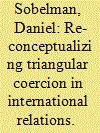

|
|
|
|
|
| Summary/Abstract |
Although coercion literature has traditionally focused on two-actor dyads, coercion in three-actor settings is a prevalent yet understudied strategy in International Relations. Such cases of “triangular coercion” represent a phenomenon whereby a coercer who lacks direct leverage over a resilient target coerces a third party who does possess leverage over the target, and to whom the target is vulnerable, and manipulates it into a clash of interests with the target. By forcing an otherwise uninvolved intermediary to align with the coercer, a coercer can alter the balance of vulnerability vis-à-vis its otherwise resilient target and enhance its susceptibility to coercion, albeit by extension. Existing scholarship tackles triangular coercion from different angles and mostly focuses on actor typology. This article seeks to promote our understanding of this strategy by proposing a conceptual model that distills its logic into the abstract components of vulnerability, resilience, and leverage. To demonstrate the dynamics of triangular coercion, the article draws on three empirical cases: Israel’s failed attempts to force Lebanon to rein in Hezbollah in the 1990s, Nazi Germany’s successful manipulation of Britain and France into coercing Czechoslovakia in 1938, and the Soviet Union’s success at forcing the United States to coerce Israel in 1973.
|
|
|
|
|
|
|
|
|
|
|
|
|
|
|
|
| 5 |
ID:
193015


|
|
|
|
|
| Summary/Abstract |
In the last 40 years, the international community has made considerable progress towards the regulation of inhumane conventional weapons (ICWs) by adopting treaties that regulate or ban these weapons. However, many states have still not joined these treaties or have joined them with a considerable delay. These ratification decisions cannot be satisfactorily explained by the existing literature on the origin of ICW treaties, which stress the role of global socialization processes. This article offers a theoretical argument that explains state decisions on the ratification of ICW treaties. It argues that while democracies and countries located in regions with high ratification rates are prone to ratify ICW treaties, an insecure external environment impedes or delays ratification. The argument also claims that security costs resulting from the characteristics of the individual treaties can modify the effects of these explanatory factors. To provide an empirical test for the argument, the article conducts a survival analysis that covers the ratification processes of the three existing ICW treaties.
|
|
|
|
|
|
|
|
|
|
|
|
|
|
|
|
| 6 |
ID:
193012
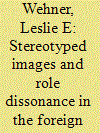

|
|
|
|
|
| Summary/Abstract |
Populist leaders unfold anti-elite rhetoric to sustain the ‘in-group’ morale of the ‘people’ they represent. Populist projects contain an ‘us’ versus ‘them’ dimension constituted by the stereotyped images that serve to inform the role-selection process in foreign policy. When images shaping roles on the international stage are used against the ‘out-group’, they become stereotypes of other actors. Therefore, this article explores how anti-pluralist populist leaders such as Jair Bolsonaro and Donald Trump use stereotyped images, and how these images – which speak to intention, affective tags and the evaluation of options – shape the foreign policy role behaviour of the states in question. The article develops a framework at the interplay of images and roles to analyse how these two aspects are used by the leader in an oversimplified manner to delineate boundaries between self and other, and thus to identify the membership base of the populist project versus those who are seen as a threat to their populist foreign policy.
|
|
|
|
|
|
|
|
|
|
|
|
|
|
|
|
| 7 |
ID:
193017
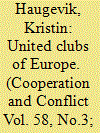

|
|
|
|
|
| Summary/Abstract |
This article makes the case for integrating informal, social and minilateral dynamics in analyses of ‘differentiated integration’ in the European Union (EU) context. In EU studies, differentiated integration has mainly served as an analytical lens for studying variation in states’ degree of formalized commitment to the European integration project or in organizational decision-making procedures across policy areas. While this focus has generated important analytical and empirical insights, three dimensions tend to be lost when limiting the study of differentiated integration to negotiated outcomes manifest in legal documents and decision-making procedures. First, informal processes of integration precede and concur with formal ones. Second, European integration is an inherently social process, and member states integrate with the EU identity-building project in different ways and to different degrees. Third, member states enjoy heterogeneous social ties with one another, routinely forming informal bi- and minilateral coalitions in everyday decision-shaping processes. More knowledge about these informal and social dynamics can give us a better understanding of how differentiated integration manifests itself in practice and where the European integration process is heading. The theoretical argument is buttressed by data from the 2020 European Council of Foreign Relations’ ‘Coalition Explorer’ survey, showing how partner preferences within the EU continue to reflect stable social sub-orders.
|
|
|
|
|
|
|
|
|
|
|
|
|
|
|
|
|
|
|
|
|